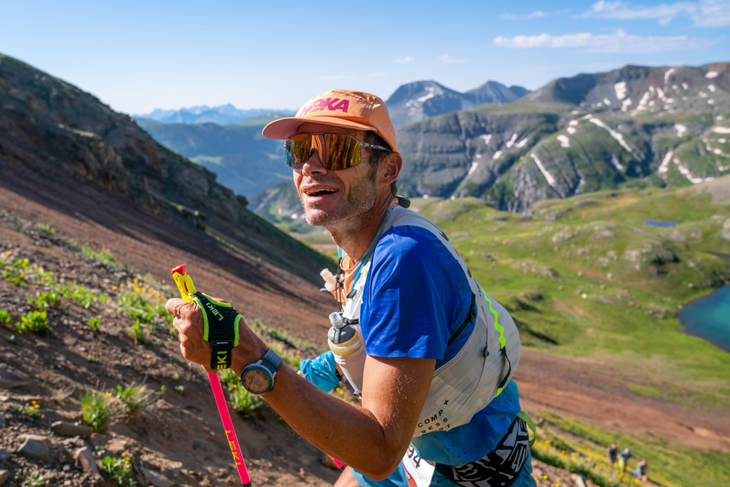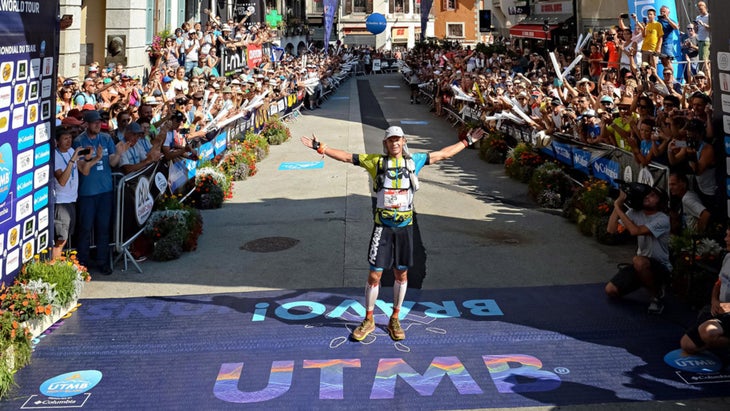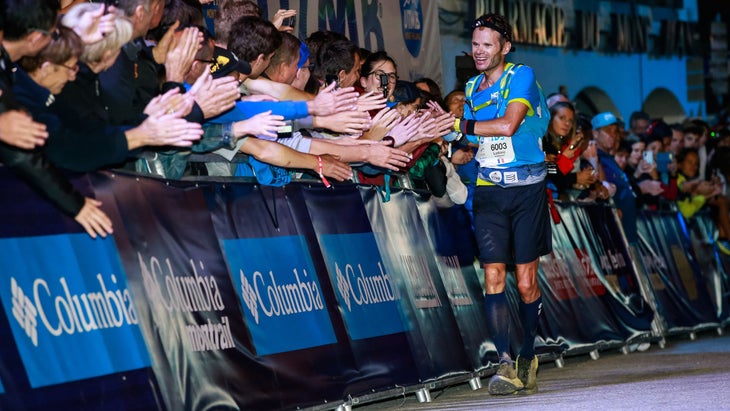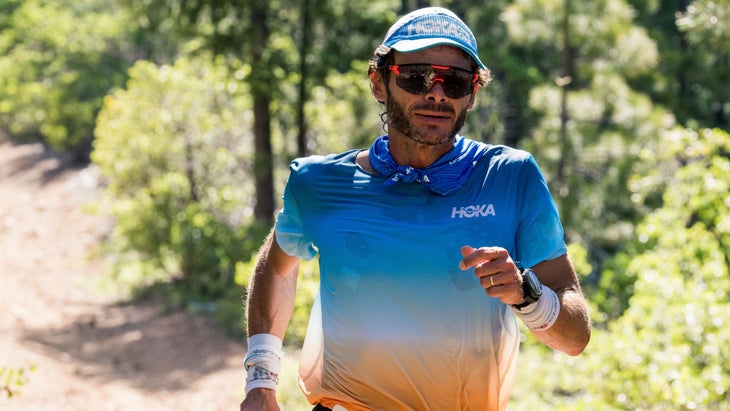This 50-Year-Old Just Won Hardrock (Again). Can He Back it Up with UTMB?

Pommeret at Western States 2022, where he placed 6th in his age group (40-49) and 6th overall. (Photo: UTMB)
Editor’s Note: This story originally ran in the lead-up to the 2024 UTMB, where Ludo Pommeret finished fifth. But déjà vu: Like last year, Pommeret won the 2025 Hardrock 100 in a course-record time. And, like last year, he’s doubling-back for UTMB. So we figured we’d revisit this excellent profile from Doug Mayer of the 50-year-old icon.
“Everything went as I would have wanted. My training went well, and together with my pacers Arthur and Jérémy, we enjoyed the course.”
Ludovic Pommeret is talking about his win at the Hardrock Hundred Mile Endurance Run in Silverton, Colorado, in mid-July. And that kind of subtle declaration, as I have come to understand it about him, is quintessential “Ludo.” Low-key and understated to the verge of an implausible modesty. (The Hardrock 100, as it is known, is one of the hardest ultra-distance trail runs in the world. And the second place runner, by the way, finished more than three hours behind him.)
At 49, Pommeret has reached that grizzled veteran stage where most trail runners only care about competing in their age group. But Pommeret—and everyone simply knows him as Ludo—is still quietly winning races outright in his own understated way. And not just local or regional events, but some of the fiercest, toughest races in the world, with the competition to match. Hardrock, after all, has the phrase “Wild & Tough” baked into its logo. At 102.5 miles long and with 33,197 feet of climbing and descending, much of it at lung-busting altitudes, those adjectives aren’t promotional marketing bluster.
Similar Reads

A month after his Hardrock win, we’re chatting in Argentiere, France, lounging in comfy deck chairs at the training camp headquarters of his longtime sponsor, Hoka. The relaxed vibes at this chalet, which sits above the trail running-crazy town of Chamonix, is the perfect setting for an interview with Pommeret, since he’s about as laid back as one could imagine. (It’s also the perfect locale because he will be toeing the line in Chamonix on August 31 for this year’s Ultra-Trail du Mont-Blanc, a race he won in 2016.)
Pommeret just might be one of the world’s best trail runners you’ve never heard of. And from his point of view, that’s just fine. After explaining the gist of the article to him, Ludo laughs out loud and captures the thesis in his own way. “Who’s the old guy?” he says, smirking.
It’s a good question. And one that is well overdue to be answered.
Trail Running by Chance

Pommeret was born in Grenoble, France. The southeastern France city lies at the intersection of three mountain ranges, but his family was fairly traditional and didn’t partake in mountain sports. When Ludo was 8, they moved 65 miles away over the Belledonne mountains to Valloire, a high mountain village of just over 1,000 residents, where his father oversaw the upkeep of the ski area lifts. His one sibling, Carole, remains in the town, where she works as a hairdresser. It wasn’t a sporty upbringing, though his mom did enjoy mountain hikes. Ludo avoided running—“I thought endurance sports were boring!”—but he did gravitate towards snowboarding and windsurfing.
In high school, at age 18, he met Céline Margueron. The two married in 2000, when Pommeret was 25. Margueron brought running into Pommeret’s world through both herself and a trail running brother, Damien. That same year, Pommeret and his brother-in-law ran one of France’s biggest ultras at the time, For’tiche, a 120K (75-mile) race that starts in Valloire. The goal was to finish, but both ended up dropping out.
Around the same time, a new race, called the Ultra-Trail du Mont-Blanc, was arriving on the scene. In 2004 he tried the 100-mile loop around Mont Blanc, DNF’ing again. “My goal was to meet the challenge, and I guess I had my answer!” he laughs.
Pommeret regrouped, taking a step back to run shorter races and to focus on his training. The reboot paid off, and by the fall of 2008 he was ready to go long once again. The results started coming in: sixth at France’s Festival des Templiers in 2011, second at Reunion Island’s Diagonale des Fous in 2014, fifth at the IAU World Championships in 2015, and redemption at UTMB with a big win in 2016.
That race has gone down in UTMB history as one of the greatest comebacks of all-time. Starting at the back of the pack, Pommeret struggled with an upset stomach. About 50K in, at Les Chapieux, France, he was in 48th position. By Lac Combal, Italy, 17K later, he had moved up a dozen places.
His friend Nico Mermoud was following along. “I thought to myself, if he keeps going that fast, he’s going to end up in first place. And that’s exactly what happened.” The French use a Spanish phrase to describe that day for Ludo: La Remontada, The Comeback.
Pommeret met his friend Mermoud during the summer of 2009 in Annecy, France. That year and in ensuing years, Pommeret played a role in the launch of a new trail running shoe that Mermoud was developing with a partner. Together, they went for a run wearing some funny looking, thickly padded shoes that were, at the time, unbranded.
“I told him to ‘take a pair to Diagonale des Fous’ and use them at the race, no obligation,’” Mermoud says. “He used the shoes for half the race. I think it helped protect him and keep his legs fresh. He came in second, and those shoes became the Hoka Mafate. That was the beginning!”
Mermoud went on to become Hoka’s co-founder and the brand’s first CEO.
As the years have rolled by, Pommeret has been a reliable presence at many of the world’s hardest and most competitive races, with podium results in four world championship events, Diagonale des Fous, UTMB’s TDS 148K and CCC 100K races, and this year, his dominating win at Hardrock. But he’s a consummate professional in more than one field.
Off One Radar, But On Another

If Pommeret is off your radar, it’s entirely understandable. He is, well, impressively normal. Not elite-normal as one might expect, but well, normal-normal—as in, trail running is just one facet of a busy life that includes work and family.
The short-hand circulating in trail running circles is that Pomerret is an air traffic controller, but that’s not quite accurate. In fact, for the past 20 years, he’s worked in IT for Sky Guide, a Swiss company where he develops and maintains air traffic simulations so Swiss controllers in Geneva and Zurich can keep their flight guidance skills honed.
His routine these days is, well, pretty good: Tuesday through Thursday he bikes to work at the Geneva Airport, then runs back to the family’s home just outside Geneva. If he needs vert, the Jura mountain range on the Swiss-French border is nearby. Friday through Monday, he and Céline head to the family home in Modane, France, not far from the Italian border. Those days away from air traffic simulations allow for bigger mountain efforts.
For the past two decades, Pommeret has had to find the balance points on the three-way seesaw that is work-life-running. How did he do it? He starts from a point of modesty. “I don’t consider myself an elite athlete,” he says. “I don’t have the financial pressure of running as a job, and that takes some of the pressure off.”
Some of it—but not all. “The compromise, it’s hard to figure out sometimes,” he adds. Pomerret’s work hours are fixed, and the remaining time is his to juggle. “The trick is to not neglect either training or family. Of course, there are moments when you need to focus more on your training, and there are moments when you must focus on your family, for example around the holidays. I try to keep that equilibrium.”
RELATED: So You Want to Run UTMB? Here’s How to Qualify.
What to Know About Ludo

If there is one thing to know about Pommeret, it’s that he is practically overflowing with good energy. It’s pleasantly infectious. Our interview takes place poolside at a chalet Hoka has rented for its athletes, and it seems entirely plausible we might end up drinking beers in the pool a few feet away.
“Ludo is authentic,” says Mermoud. “He and I both come out of the French Alps. We were raised by mountain people. There’s no bullshit.” Mermoud remembers an earlier Ludo, 15 years ago now, who was a bit more introverted. “As soon as we met, we had a good vibe. We had a great time together. Ludo never brags or shows off. He’s just a really good guy.”
“What comes across, all the time, is a sort of stress-free joy of living, and a generosity,” says Nicolas Fréret, the host of a popular French language trail running podcast, La Bande à D+. Fréret remembers last year’s UTMB. The Chamonix race week energy is always intense, with a supercharged melange of stress, anticipation, hope, and foreboding. Chamonix at the end of August is where trail running dreams come to either be realized…or literally dashed on the rocks.
“Ludo was walking around town, talking to people, laughing, cheering runners, on the trail encouraging his wife as she was racing, biking around town, always in a good mood,” says Fréret. “That’s just Ludo. That style is his defining characteristic, I think.”
It’s a sharp contrast to most other elite athletes during UTMB week, who disappear into a protective bubble of their own creation. Focussed on their “A” race, some play a cat-and-mouse game trying to avoid sponsor requests, and stay chalet-bound, hoping to dodge whatever new international viruses may be multiplying along Rue du Dr. Paccard.
His fellow runners look up to Pommeret. Mermoud, himself a strong trail racer, calls Pommeret “a machine” for his consistency and late-race determination.
“He’s unstoppable. He’s very intense in everything he does.” Mermoud pauses, citing a moment in Pommeret’s life when he somehow managed to find time to build his house in Moden himself—amid work, family, and training.
Swiss runner Diego Pazos agrees with Mermoud’s assessment. At this year’s Hardrock, Pazos came in second to Pommeret. “Ludo’s a clever runner. Mentally, he’s very tough,” he says. “He knows his pace, he’s great at running downhill and he’s really strong when he’s power hiking uphill. He’s a complete runner.”
Before long, as often seems to happen when people are talking about Pommeret, Pazos reflects on what he appreciates about him as a person. “He’s very nice, very humble. He’s one of my best friends in the trail community.”
“Soon,” says Pazos, “Ludo will have more time. He will still be performing well for some years. He’s a good example that you can keep trail running and you still perform over 50 if you take care of yourself.”
The Ludo Formula
Through the years-turned-decades, Ludo Pommeret has been remarkably injury free, which he attributes to three factors. “If you look at my volume of running, it’s less than other runners. By the end of the year,” says Pommeret, “I’ve done 3,000 kilometers and my friends have done 5,000.”
Second, in the winter, Pommeret switches sports to ski mountaineering, a pattern common among many European trail runners. “I think that has prevented a lot of injuries for me,” he says. “Taking three weeks off a year, in my mind that’s not really enough to have a good recovery period.”
Finally, Pommeret’s running career started much later than many other elite runners. “I started running seriously at age 25.” He pauses and laughs. “I certainly didn’t start too young!” As well, those first years were fairly informal, with no rigorous coaching. Pommeret would race casually, often every few weeks, and not train much in between. Thinking back to that period, he now realizes that it benefited him in other ways as well. “I think that approach has helped me keep my motivation over the years, too.”
Ludo, 2024
His girls are older now, and launched on their own career paths. Pommeret and Céline will soon be empty nesters, with Pommeret fully retired at age 50. There are plenty of miles on trails around the globe still to come. The two are daydreaming about doing races together. Perhaps one this fall, and maybe even UTMB next year.
With a win in Silverton, Colorado already on his list of accomplishments for the year, Pommeret is turning this attention to, as he puts it, “a little-known race in Chamonix, France.” It will be fully two decades since he first lined up for the start of UTMB, outside the mayor’s office, under the world’s most famous trail racing arch. In an interview earlier this year, he told the French sports magazine L’Équipe his hopes for UTMB 2024. “I won’t be going with any great ambitions,” he confessed. “It’s mostly to enjoy this anniversary.”
Ludovic Pommeret does have one goal in mind, however. “I just hope I don’t DNF, like in 2004.”
Pazos, for his part, is expecting more. “If Jim [Walmsley] or Matthieu [Blanchard] stumble, Ludo will be there. Keep an eye on him. And if Ludo passes you, it’s the end of the game for you!”
Constant Wiederkehr provided research assistance for this article.


